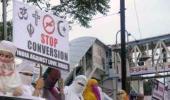There have been over 300 attacks against Christians and their churches and prayer halls, primarily in northern India, states Aakar Patel.

The People's Union for Civil Liberties published a report on the concerted attacks against Karnataka's Christian community and their places of worship.
Also, Karnataka announced a law that further curbs religious freedom for minorities.
I contributed to the PUCL report and thought its findings were worth sharing.
The background to this is that targeted attacks on religious minorities and their places of worship are on the rise across India.
In the first two weeks of December 2021 alone attacks against Christians were reported in Madhya Pradesh, Haryana and Karnataka.
Incidents of organised violence and disturbance against the community have been accompanied by threats that are being followed up by legislation.
Laws restricting religious freedom and regulating interfaith marriage have been legislated in five Bharatiya Janata Party states since 2018, squeezing the right to freely propagate and practice religion.
The BJP government in Karnataka is also proposing to survey the state's churches, to no apparent end other than monitoring Christians, their religious activity and their places of worship.
Hate crimes are not registered as a separate category by the State and there is little official information available on the matter.
A fact finding report released earlier this year documented over 90 hate crimes and mentioned over 300 against Christians and their churches and prayer halls, primarily in northern India.
This report (Christians under attack in India, by the Association for Protection of Civil Rights, United Christian Forum and United Against Hate) has recorded themes that the present report also corroborates.
These are the denial of worship, the illegal detention of clergy and worshippers and the filing of false complaints.
And all of this is accompanied by the pushing of legislation and of inflammatory rhetoric from the BJP and its leaders and associates.
It is important that civil society document to the best of its ability the violence, repression and intimidation aimed against India's minorities, often with the approval of the State and the parties in power.
In Karnataka, this is the way in which the attacks happen: An organised group often numbering in the hundreds intrudes and begins chanting bhajans and slogans inside the church and prayer hall while the service is on.
They shout accusations of 'forcible conversion' without defining what this is or any evidence that it is happening.
They are often violent and assault those gathered for prayer.
The police appears to be aware of the impending violence, but arrives often after the event.
The mob records their criminal trespass and violence on their phones, but often prevent the worshippers from doing the same, leaving little or no visual record of the offence.
The mobs signal their religious difference through flags, scarves and slogans emphasising the intended polarisation.
Their trespass is not seen as the primary crime by the State and also the media which does not appear to be able to look past the unsubstantiated and even undefined accusations of 'forced conversion'.
The pastor and other clergy are often snared by the mobs and the police files cases against the victims, including those who are merely exercising their constitutional and fundamental right to practice their faith.
The role of the State is often negative, and the police intrudes into the personal lives of the worshippers, demanding to know what caste they belong to.
They note the identities and the personal details of the clergy and worshippers and tend to intimidate those they are required to protect.
Often the result is that worshippers stop coming to mass, and perhaps that is what is intended.
Indeed the State itself often instructs, as this report will show, the church to discontinue its activity and its prayer, ostensibly a fundamental right enjoying a high degree of freedom from State encroachment.
In one instance the police was offended that Christians were congregating to worship on the day of a Hindu festival.
Often the role of the police is not to ensure that the violence and intimidation is contained, but to seek 'compromise' between the attackers and the attacked so that 'order' is prioritised over law.
The focus is usually on looking beyond the acts of violence and intimidation.
The violence is also accompanied by casteism and caste-based abuse and violence.
The attackers and intruders often use casteist abuse when addressing the worshippers.
Worshippers continue to be targeted after the initial act of intrusion and violence.
After the violence, this report documents the trauma that ensues from societal causes: The loss of livelihood in some cases, social boycotts, ostracisation, the loss of entitlements, the loss of residences in other cases and in all cases a loss of dignity.
The individuals that cause offence come from the Hindutva umbrella groups and are organised by them, as the PUCL report shows.
BJP legislators and ministers also are sometimes directly involved.
However, the ensuing damage in terms of the social ostracisation and boycott usually happens because it is the neighbours and associates, previously unperturbed, who turn against the victims.
Sometimes, the victims and survivors also lose their jobs and livelihood.
This seems to show that the spread of the prejudice ripples on after the event and the immediate act of violence is not the only problem.
The impending legislation in Karnataka will accelerate the process of the targeting of minorities by Hindutva groups, will give cues to the State and particularly the police to join in and prevent and obstruct the freedom of religion of Karnataka's Christians and will encourage vigilantes to make their name by attacking congregations.
This will be consistent with events in the other five BJP-governed states that have legislated laws against freedom of religion since 2018.
Aakar Patel is a columnist and writer and you can read Aakar's earlier columns here.
Feature Presentation: Aslam Hunani/Rediff.com











 © 2025
© 2025